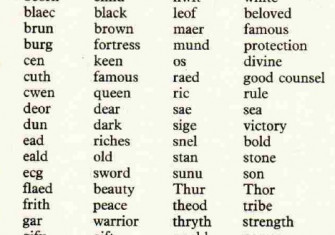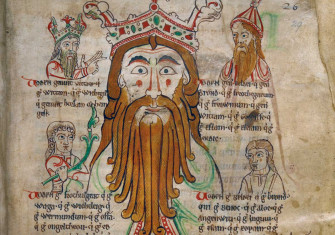A Noble Stone Gathers No Moss
Far from a static system, Anglo-Saxon personal names reflected societal changes.
Alfred the Great’s illegitimate grandson, King Athelstan, became known to posterity by the epithet ‘the Glorious’, which must only be a couple of rungs below his grandfather on the ladder of kingly sobriquets.
While Athelstan’s glorious nickname was only applied posthumously, his name, like most Old English names, was a compound, combining two elements – words taken from the vocabulary of everyday language. The first element Æðel- meant ‘noble’, while the second element -stan meant ‘stone’. Athelstan was, in name at least, a ‘noble rock’.
Such names were not the reserve of royalty. In fact, this sort of name was common among people of all ranks of society across Anglo-Saxon England. While the grandson of a king might rightly have expected an illustrious life, living up to the promise of his noble names, the same could surely have not been said for the multitude of future cowherds and milkmaids across the land who were given names marking them out as noble beauties (Æðelflæd), wise protectors (Eadmund) or powerful wolves (Wulfweald). Perhaps being a dear friend (Leofwine) was a more realistic aim for most parents.
While it is hard to tell exactly how important the meaning of name elements were, it seems likely that people were aware, to some extent, that names carried some kind of meaning. Indeed, one of the most famous, or infamous, Anglo-Saxons is most often known to us today as Ethelred the Unready, the king who lost his kingdom to Cnut. However, the name Ethelred signified ‘noble counsel’. So, when his contemporaries labelled him Æðelræd Unræd they were not calling him ‘unready’, but using the meaning of his name to mock his lack of good counsel. Similarly, when Archbishop Wulfstan entitled his homily to the English people ‘Sermon of the Wolf to the English’, he was clearly doing so in the knowledge that the first part of his name did not just sound like, but signified, ‘wolf’. Surely it cannot be coincidence that ‘rich’, ‘strong’ and ‘beautiful’ were used in names, where ‘poor’, ‘weak’ and ‘ugly’ were not.
A feature of this naming system was flexibility. There was a finite number of elements, but they could be combined in a multitude of ways. This meant that, in essence, a name was created for, rather than given to, each person. So, while elements could be repeated to emphasise parentage and family links, there was very little repetition of full names and it would be unlikely that any two people within a community or family would have the same name.
However, this compound naming system was not universal and unchanging throughout the Anglo-Saxon period. There was always significant minority of simple names such as Tutta, Babba and Ælle. And Old English names rubbed shoulders with names of British and Scandinavian origin. Indeed, one of the most celebrated early Anglo-Saxon kings, Cerdic, bore a name that is thought to be a form of the British Caradoc. In the century before the Conquest, Scandinavian names had become so common in some areas that, not only had names such as Toki and Gyða been incorporated into the naming stock, but hybrid names had developed, creating truly Anglo-Scandinavian names, like Ælfcytel (combining Old English Ælf-, ‘elf’, and Old Norse -kettill, ‘cauldron’). Scandinavian patronymic suffixes were even added to perfectly Old English names to mark parenthood – at least in the case of Ælfric Wihtgarsson, and his son Wihgtar Ælfricsson. And we do not think it in the least bit strange that the last ‘Anglo-Saxon’ king of England, Harold, bore a Scandinavian name, Haraldr.
It was not only outside influence that had an impact on the English naming system. Later Anglo-Saxon society evolved and the naming system evolved with it. New name elements were introduced, such as God-, meaning ‘good’ or ‘god’, -cild, meaning ‘child’ and -sunu, meaning ‘son’, perhaps indicating a greater emphasis on religion and parentage than on glory in battle. Name elements were shortened and compound names contracted: Ælfsige became Alsi, Æðelgar became Algar and Leofwine became Lefwin. We also increasingly see names being copied and passed down in their entirety, losing some of their compound nature. This went hand in hand with an increase in popularity of a small number of names, as people appear to have become less interested in the individuality of a name and perhaps more concerned in highlighting similarities with their friends, neighbours and notable people.
With the Norman Conquest looming large on the horizon, even more changes were to come in the English naming system. What we can say is that ‘Anglo-Saxon’ personal naming was never one static system, disconnected from the world around it. It was an an ever-evolving reflection of society, responding to changes in language and culture caused as much by developments in the way English people lived their everyday lives as by foreign invasion.
James Chetwood is a Wolfson Postgraduate Scholar at the University of Sheffield, studying medieval English naming. @chegchenko






